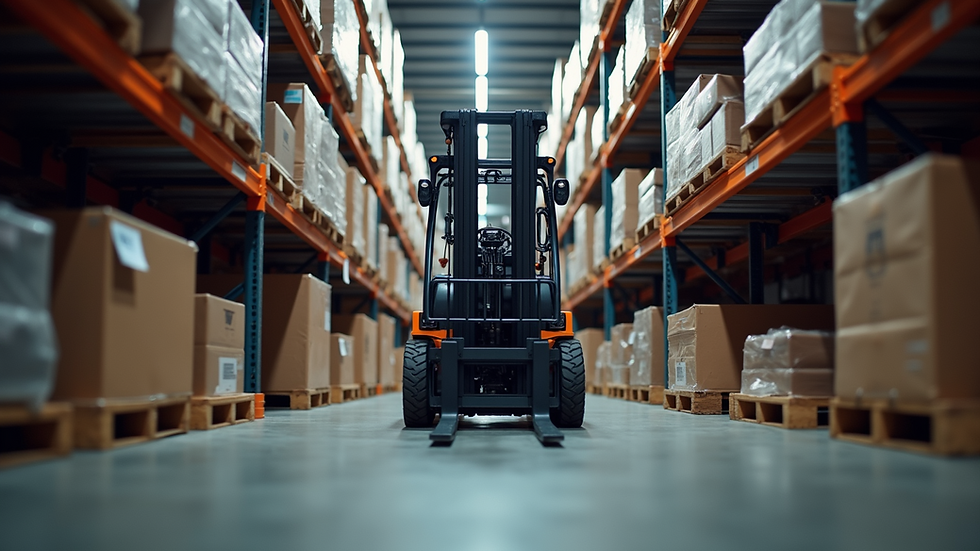Key Benefits of Renting Equipment for Your Business
- Michael Gray

- Jun 4, 2025
- 3 min read
In today's fast-paced business environment, companies are constantly seeking ways to optimize their operations and manage costs. One effective strategy gaining traction is equipment rental. Whether you're a startup or an established enterprise, renting equipment can offer flexibility and financial advantages that buying outright cannot match. This blog post will explore the key benefits of renting equipment for your business, highlighting how it can help you save money, minimize risks, and adapt to changing market demands.
Understanding Equipment Rental
Equipment rental refers to the practice of leasing tools, machinery, or other essential items from rental companies for a specified period. This approach is often preferred in industries such as construction, landscaping, and event planning where equipment needs can fluctuate. Renting allows businesses to access a wider range of tools without the financial burden of outright purchase.

The growth of the equipment rental market showcases the increasing reliance on this model. According to a recent study, the global equipment rental market is projected to reach $200 billion by 2026, driven by demand in construction, agriculture, and industrial sectors.
Cost-Effectiveness of Renting Equipment
One of the primary advantages of renting equipment is cost savings. Purchasing heavy machinery involves substantial upfront costs, along with ongoing maintenance and storage expenses. In contrast, when you rent equipment, you only pay for what you use. This can significantly free up capital, allowing you to allocate funds toward other critical areas of your business.
For instance, if you require a specialized machine for a short-term project, renting it for a few weeks may cost a fraction of the purchase price. Additionally, many rental companies offer maintenance and support as part of the rental agreement, meaning you don't have to worry about additional costs for repairs and servicing.

According to industry estimates, businesses can save up to 30% on equipment costs by choosing rentals over purchases. This financial flexibility can be vital for startups and small businesses looking to grow without overextending their budgets.
Access to the Latest Technology
When you rent equipment, you have the opportunity to use the latest technology without committing to a long-term investment. Many rental companies regularly update their fleets to include the newest models, which often come with enhanced features, better fuel efficiency, and improved safety standards.
This access to cutting-edge equipment can provide your business with a competitive edge. For example, if you run a construction company and rent the latest excavator that boasts advanced GPS technology, you can complete projects more efficiently and accurately.
Additionally, keeping up with the latest technology ensures that your operations remain compliant with industry standards and regulations, as many new machines are designed with enhanced safety features.
Flexibility and Scalability
Renting equipment offers unparalleled flexibility. As businesses grow, their equipment needs evolve. Renting allows you to scale up or down according to project demands without the constraints of owning unnecessary equipment.
For instance, if your company secures a large contract, you can easily rent additional machinery to meet the increased demand. Conversely, if a seasonal slowdown occurs, you can return unused equipment, thereby reducing your operational costs.
This flexibility is especially valuable for businesses in industries with fluctuating workloads, such as landscaping or seasonal retail operations. Instead of incurring fixed costs for equipment you only use sporadically, renting allows you to adapt quickly to market changes.

Risk Mitigation
Investing in equipment can be risky, especially in uncertain economic climates. Market fluctuations can render purchased equipment obsolete or result in increased operating costs. Renting mitigates these risks by allowing companies to avoid commitments associated with ownership.
When you encounter changes in your business environment, such as economic downturns or shifts in customer demand, you can simply return the equipment you no longer need. This approach reduces the risk of depreciation and allows for better cash flow management.
Moreover, renting equipment typically includes insurance coverage through the rental company. This adds another layer of protection, safeguarding your business against potential losses due to equipment damage or theft.
Conclusion: Embracing Equipment Rental for Better Business Performance
Renting equipment has become a strategic move for businesses aiming to optimize their resources, manage costs, and remain competitive. The financial benefits, access to the latest technology, flexibility in scaling, and reduced risks make renting an attractive option. As you consider your business's equipment needs, think about integrating a model that includes renting as a key component of your operations.
For businesses that require heavy machinery like forklifts, exploring a reliable forklift rental service can provide a hassle-free solution to meet your operational demands while keeping costs in check. Embrace the power of equipment rental and watch your business thrive.




Comments